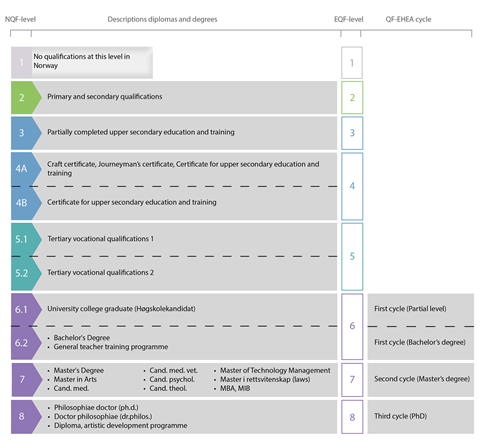Norwegian qualifications framework for lifelong learning
The Norwegian qualifications framework for lifelong learning (NQF) gives a view of the Norwegian educational system and its levels of qualifications. NQF is a contribution to facilitate the work on lifelong learning.
On a later stage the Norwegian qualifications framework is to be used as a transparency tool for comparison of Norwegian qualifications with qualifications from other countries, via the European qualifications framework (EQF) and/or the European qualifications framework for higher education (QF-EHEA). NQF intends to promote cross-border mobility.
Implementation of the NQF
The NQF gives a description of the formal Norwegian education and training system. The NQF levels are formulated on the basis of what a person know, can do, and is capable of doing as a result of a learning process. The outcomes of the completed learning process are described in the categories “knowledge”, “skills” and “general competences”. The NQF also gives an overview of included degrees, diplomas, certificates, craft or journeyman’s certificates and documents of skill.
The NQF is a national overarching qualifications framework. Study programs and subject related learning outcomes descriptions are written in syllabics and curricula’s.
The NQF is a tool for easier understanding of the:
- correlation between the levels of qualifications in the educational system
- difference between the learning outcomes at the various levels in the NQF
- different paths to achieve a qualification through education
The levels of qualifications in the NQF
The Norwegian qualifications framework (NQF) has seven levels. All levels are defined as a qualification written as learning outcomes in the categories of knowledge, skills and general competences.
Its core is the seven reference levels of qualifications, from those obtained at the end of lower secondary education, (level 2) to the highest (level 8, ph.d. or equivalent). The three highest levels correspond to higher education levels as also defined within the European Higher Education Area.
The Norwegian table of qualifications
Levels and learning outcome descriptors
The NQF levels are formulated on the basis of what a person know, can do and is capable of doing as a result of a learning process. The outcomes of the completed learning process are described in the categories “knowledge”, “skills” and “general competences”.
The categories describing learning outcomes include:
Knowledge: Understanding of theories, facts, principles, procedures in subject areas and/or occupations.
Skills: Ability to utilise knowledge to solve problems or tasks (cognitive, practical, creative and communication skills).
General competence: Ability to utilise knowledge and skills in an independent manner in different situations.
Level 1 is not part of the NQF, and is therefore not included in this overview.
Terms and concepts
Here you can find an overview of the key terms and concepts used in the national qualifications framework, and explanations of the most important of them. The sorting is based on related concepts.

